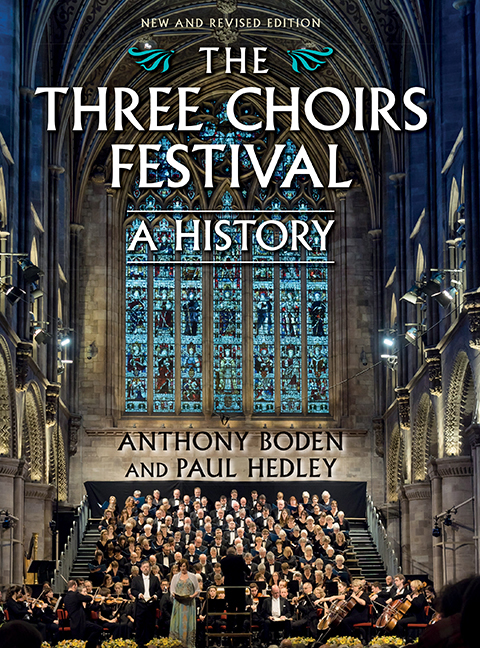Book contents
- Frontmatter
- Contents
- List of Illustrations
- Preface
- Acknowledgements
- List of Abbreviations
- List of Cathedral Organists
- 1 Origins
- 2 A Fortuitous and Friendly Proposal
- 3 A Numerous Appearance of Gentry
- 4 ‘The Musick of my Admiration Handel’
- 5 The Gentlemen and the Players
- 6 Avoiding Shipwreck
- 7 Prima voce
- 8 Favourites and Flops
- 9 Sacred and Profane
- 10 Froissart
- 11 The Unreasonable Man
- 12 The Dream
- 13 Beyond these Voices
- 14 An Essentially English Institution
- 15 The Elgar Festivals
- 16 Dona nobis pacem
- 17 Recovery
- 18 Association
- 19 A New Epoch
- 20 Jubilee
- 21 Theme with Variations
- 22 Houses of the Mind
- 23 ‘A Gold-Plated Orchestra’
- 24 A New Millennium
- 25 Reorganisation
- 26 An Invitation to the Palace
- Appendix Three Choirs Festival Timeline
- Select Bibliography
- Index
- Plate section
16 - Dona nobis pacem
Published online by Cambridge University Press: 11 August 2017
- Frontmatter
- Contents
- List of Illustrations
- Preface
- Acknowledgements
- List of Abbreviations
- List of Cathedral Organists
- 1 Origins
- 2 A Fortuitous and Friendly Proposal
- 3 A Numerous Appearance of Gentry
- 4 ‘The Musick of my Admiration Handel’
- 5 The Gentlemen and the Players
- 6 Avoiding Shipwreck
- 7 Prima voce
- 8 Favourites and Flops
- 9 Sacred and Profane
- 10 Froissart
- 11 The Unreasonable Man
- 12 The Dream
- 13 Beyond these Voices
- 14 An Essentially English Institution
- 15 The Elgar Festivals
- 16 Dona nobis pacem
- 17 Recovery
- 18 Association
- 19 A New Epoch
- 20 Jubilee
- 21 Theme with Variations
- 22 Houses of the Mind
- 23 ‘A Gold-Plated Orchestra’
- 24 A New Millennium
- 25 Reorganisation
- 26 An Invitation to the Palace
- Appendix Three Choirs Festival Timeline
- Select Bibliography
- Index
- Plate section
Summary
THE year 1934 robbed English music not only of Sir Edward Elgar but also of Gustav Holst and Frederick Delius. Without Elgar or Holst there was a sense of grievous loss to the musical and social round of Three Choirs, and this was reinforced at the 1934(G) Festival by the additional absence of Vaughan Williams, who had cut his foot while bathing and was suffering from a poisoned abscess.
In 1933(H), Percy Hull, continuing a policy of gradual change, had decided to include Elijah, dropped in 1930(H), but to perform only an abridged version of Messiah. Sumsion, in 1934(G), omitted Elijah but followed Hull's lead by presenting only the abridged Messiah, thus making room on the Friday morning for W. H. Reed's Symphony for Strings, Haydn's Te Deum, and the Brahms Violin Concerto with Jelly d'Aranyi as soloist. In place of Elijah on Tuesday, The Kingdom, conducted by Sumsion, was given ‘In Memoriam Edward Elgar’, followed by Kodály's Psalmus Hungaricus and Vaughan Williams's Pastoral Symphony, conducted by Gordon Jacob in the composer's absence. Other contemporary pieces heard during the week included Summer Music and St Patrick's Breastplate by Arnold Bax; Elegy for strings and Procession by Herbert Howells; Two Ballads for baritone and orchestra by Howard Ferguson, in which Roy Henderson was the soloist; and Cyril B. Rootham's setting of Milton's Ode on the Morning of Christ's Nativity, with Isobel Baillie, Trefor Jones and Roy Henderson joining chorus, semi-chorus and orchestra under the composer's baton.
On Thursday evening, before a performance of Gerontius, G. D. Cunningham, the Organist of Birmingham Town Hall, played Handel's Organ Concerto in F major. When he had finished, ‘an embarrassing gap appeared in the proceedings whilst waiting for the B.B.C. to relay the final part of the programme’. Herbert Sumsion summoned his Assistant Organist, Melville Cook, successor to Arthur Pritchard in 1932:
‘Cook, what about playing an organ solo till they're ready to broadcast? Bach's D minor will fill the time nicely.’ Me on to the organ bench in a jiffy, all stops drawn, now for it – diddle-de – and we're off, with the help of Sir Ivor Atkins to turn the pages. A great game of guessing after the concert – was it Cunningham? No, it was Cook, making his Festival debut without rehearsal!
- Type
- Chapter
- Information
- The Three Choirs Festival: A HistoryNew and Revised Edition, pp. 221 - 226Publisher: Boydell & BrewerPrint publication year: 2017

